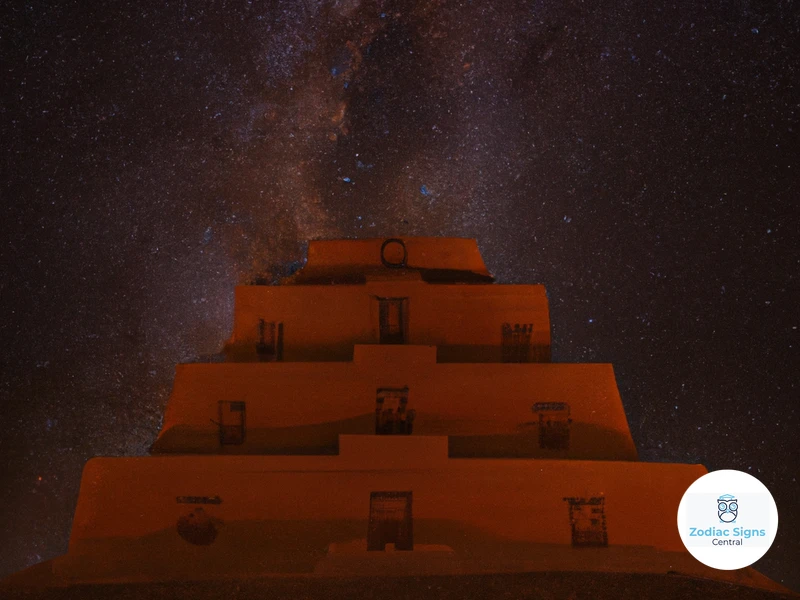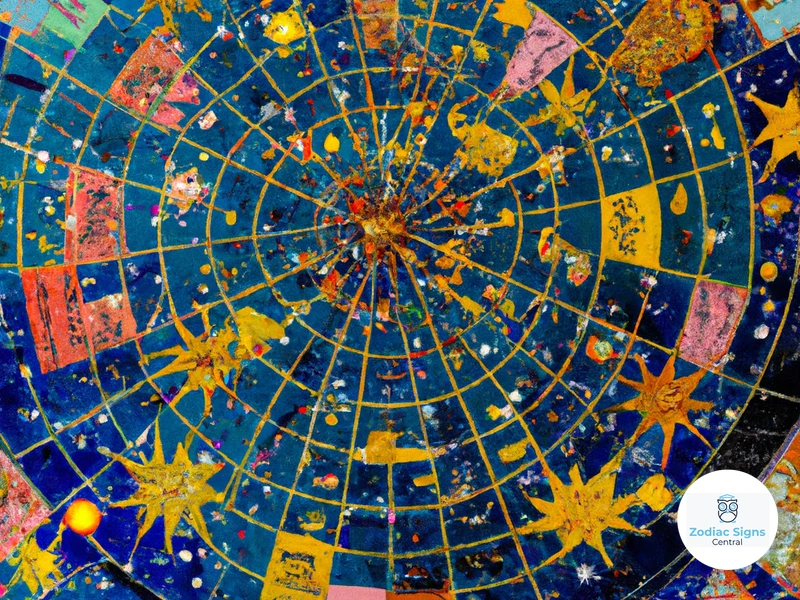Astrology, the study of celestial movements and their influence on human affairs, has a rich and fascinating history. One of the earliest civilizations to develop astrological practices was Mesopotamia, a region in ancient Western Asia. The astrologers of Mesopotamia played a pivotal role in shaping the foundation of astrology as we know it today. Their observations and interpretations of the skies paved the way for the development of astrological techniques and contributed to the transmission of knowledge to future generations. In this article, we will delve into the significance of Mesopotamian astrologers in astrological history and explore their lasting legacy on the field of astrology.
The Origins of Astrology in Mesopotamia

Astrology can trace its roots back to the ancient civilization of Mesopotamia. The Mesopotamians, who inhabited the region between the Tigris and Euphrates rivers, developed intricate astronomical observations and interpretations that laid the foundation for astrology. The practice of astrology emerged as a way to understand and predict the influence of celestial bodies on earthly events and human lives. The Mesopotamians believed that the movements of the stars and planets held significant meaning and affected various aspects of life, such as agriculture, politics, and even personal affairs. They developed a deep understanding of celestial patterns and cycles. Through meticulous observations and record-keeping, Mesopotamian astrologers identified important celestial events like eclipses, conjunctions, and planetary alignments. These observations formed the basis of their astrological predictions and interpretations. One notable aspect of Mesopotamian astrology was their association of celestial bodies with specific deities, considering them as divine messengers or heavenly representatives on Earth. These early astrological practices in Mesopotamia set the stage for the development of astrology in later civilizations, influencing the astrological traditions and beliefs that followed.
The Birth of Astrology
The birth of astrology can be traced back to the ancient civilization of Mesopotamia. It was during this time that the Mesopotamians developed a keen interest in studying the movements of celestial bodies and their potential impact on human lives. The Mesopotamians believed that the positions and alignments of the stars and planets held significant meaning and could provide insights into the course of events on Earth. As their astronomical observations became more sophisticated, the Mesopotamians began to correlate these celestial movements with various aspects of human existence, such as agriculture, weather patterns, and individual destinies. They identified patterns and recurring cycles in celestial events and developed a system of astrological predictions and interpretations based on these observations. The birth of astrology in Mesopotamia laid the groundwork for future civilizations to expand upon and refine the field. These early astrological practices set the stage for the development of astrological traditions and beliefs that have persisted throughout history and continue to influence our understanding of the cosmos and its impact on our lives.
Ancient Mesopotamian Beliefs and Astrology
Ancient Mesopotamian beliefs formed the core of their astrological practices. They viewed the universe as a harmonious system, where celestial bodies held immense power and influence over human existence. The Mesopotamians believed that celestial events and phenomena were divine messages, guiding and impacting the lives of individuals and societies. They associated each deity with specific celestial bodies, creating a complex pantheon of gods closely intertwined with astrological interpretations. For example, the planet Saturn was believed to be associated with the god Ninurta, the patron deity of agriculture and war. The movements of Saturn were seen as reflections of Ninurta’s influence on earthly affairs. By observing the positions and alignments of celestial bodies, Mesopotamian astrologers discerned the intentions and desires of the gods, providing guidance about the best courses of action for individuals and rulers alike. This sacred connection between the heavens and the mortal realm shaped every aspect of Mesopotamian life, from rituals and ceremonies to political decision-making. Astrology, with its emphasis on understanding the divine will through celestial observations, was an integral part of Mesopotamian culture and belief system.
The Role and Significance of Mesopotamian Astrologers
Mesopotamian astrologers played a vital role in the society of ancient Mesopotamia and held significant influence on the decisions made by kings, rulers, and ordinary individuals alike. These highly skilled individuals were considered expert observers of the skies, studying celestial movements and interpreting their implications for human affairs. Mesopotamian astrologers were revered for their ability to predict auspicious times for important events such as coronations, battles, agricultural activities, and even personal matters like marriage and childbirth. Their expertise was sought after by individuals from various walks of life who believed in the power of astrology to guide their decisions and actions.
The role of Mesopotamian astrologers extended beyond being mere fortune-tellers. In a society where the king was considered the intermediary between the gods and the people, astrologers served as trusted advisors to the ruling elite. Their interpretations of celestial omens and predictions held significant weight in shaping the course of political and military strategies. Kings and rulers relied on the insights provided by astrologers to make decisions regarding wars, diplomacy, and even the construction of monumental buildings. The guidance and counsel of astrologers were highly valued, as they were seen as conduits of divine knowledge and bestowed with the ability to communicate with the gods.
The influence of astrologers was not limited to the realm of politics and royalty. Ordinary individuals, too, sought the guidance of astrologers when making important life choices. Astrologers provided insights into an individual’s fate, based on their birth charts and the positioning of celestial bodies at the time of their birth. This information was used to determine one’s strengths, weaknesses, and potential life outcomes. Mesopotamian astrologers were seen as intermediaries between human beings and the divine realm, offering a link to the cosmic forces that governed human destinies.
The role and significance of Mesopotamian astrologers cannot be understated. They served as the custodians of celestial knowledge and wielded immense power and influence in Mesopotamian society. Their observations, interpretations, and advice shaped the decisions and actions of kings, rulers, and individuals, leaving a lasting impact on the course of events in ancient Mesopotamia. Their contributions to the field of astrology paved the way for future astrological traditions and continue to influence our understanding of celestial symbolism and its connection to human affairs.
Expert Observers of the Skies
Mesopotamian astrologers were expert observers of the skies, dedicating their lives to studying and deciphering the movements and patterns of celestial bodies. Their mastery of astronomy allowed them to track the positions of the stars, planets, and constellations with great precision. Mesopotamian astrologers developed sophisticated instruments, such as the astrolabe, to aid in their observations. They meticulously recorded celestial events, documenting their observations on clay tablets. These tablets contained detailed information about planetary positions, lunar phases, and the timing of eclipses. The astrologers would spend countless nights scanning the heavens, deciphering the meaning behind each celestial occurrence. Their dedication to observing the skies allowed them to identify recurring patterns and establish correlations between celestial events and earthly phenomena. They understood that certain celestial configurations could signify favorable or unfavorable events in various aspects of life, including agriculture, politics, and individual fate. The expertise of Mesopotamian astrologers as skilled observers of the skies laid the groundwork for the astrological traditions that would follow, influencing astrological practices across cultures and centuries.
Consulting the Astrologers
In ancient Mesopotamia, astrologers held a significant role in society and were sought after for their expertise in interpreting celestial omens. People would consult the astrologers for various reasons, ranging from personal matters to important events and decisions. The Mesopotamians believed that the movements and positions of celestial bodies held a direct influence on earthly affairs. To gain insight into these influences, individuals would present their specific questions or concerns to the astrologers. The astrologers, armed with their extensive knowledge of celestial patterns and interpretations, would analyze the celestial omens and provide guidance and predictions based on their findings. Their interpretations could encompass a wide range of areas, including agriculture, warfare, health, and even individual fortunes. For example, if a person sought advice on marriage, the astrologer would examine the positions of the relevant celestial bodies and determine the auspicious or inauspicious timing for such an event. These consultations with astrologers played a crucial role in decision-making processes and often influenced the course of action taken by individuals or even whole communities. The guidance provided by the astrologers was highly valued and trusted, as it was believed to be directly influenced by the divine forces represented by the stars and planets. The consultation process with astrologers not only gave individuals a sense of control and direction in their lives but also fostered a deeper connection to the celestial realms. It is through these interactions that Mesopotamian astrologers solidified their importance and became integral to the fabric of society, influencing the actions and beliefs of the people they served.
Mesopotamian Astrologers and Royal Power
Mesopotamian astrologers held a position of great significance and influence in society, particularly when it came to matters of royal power. The kings and rulers of Mesopotamia heavily relied on the astrologers’ expertise to make decisions regarding their kingdoms and the welfare of their people. Astrologers were considered trusted advisors and were often consulted before important events, battles, or even the coronation of a new king. They were believed to have a profound understanding of the celestial forces and their impact on human affairs. By interpreting celestial omens and analyzing celestial configurations, astrologers provided insights into the future, allowing rulers to navigate challenges and make informed decisions. The astrologers’ expertise helped monarchs maintain stability, establish legitimacy, and consolidate their hold on power. The close association between Mesopotamian rulers and astrologers emphasized the belief that cosmic forces played a vital role in shaping the fate of nations. This significance extended beyond individual rulers and permeated the entire royal court, with astrologers serving as trusted advisors to the elite class. The influence and status of Mesopotamian astrologers were thus deeply intertwined with the exercise of royal power, reinforcing the belief in the cosmic link between earthly rulers and the celestial realm. Their role within the royal court solidified their position as experts in astronomy and astrology, shaping the development of these fields in ancient Mesopotamia.
Astrological Techniques and Contributions

Astrological techniques and contributions made by Mesopotamian astrologers were instrumental in advancing the field of astrology. One significant development was the refinement of horoscopic astrology, which involves casting a horoscope based on the position and alignment of celestial bodies at the exact moment of an individual’s birth. Mesopotamian astrologers developed precise mathematical calculations and methods to construct these horoscopes, enabling them to make detailed predictions and interpretations of a person’s life based on the positions of planets and stars at the time of their birth. This technique provided insights into an individual’s personality traits, potential successes and challenges, and even their fate. Additionally, Mesopotamian astrologers were meticulous in recording celestial movements. They created numerous clay tablets inscribed with astronomical observations and detailed celestial calendars, which allowed for a continuous tracking of celestial events over long periods. These records were not only useful for astrological purposes but also for agricultural, religious, and administrative planning. The wealth of astrological texts and tablets discovered in Mesopotamia provides modern researchers with valuable insights into the techniques and knowledge possessed by these ancient astrologers. This archival treasure trove includes prophetic texts, catalogs of celestial omens, and comprehensive compilations of astrological knowledge. The Mesopotamian astrological techniques and contributions formed the building blocks of astrology as it expanded and evolved over time, leaving a lasting impact on future astrologers and civilizations.
The Development of Horoscopic Astrology
The development of horoscopic astrology marked a significant milestone in the evolution of astrological practices. Horoscopic astrology originated in ancient Mesopotamia and was further refined by the Greeks and Hellenistic astrologers. This method involved casting a horoscope, which is a map of the celestial positions at a specific time and place. This allowed astrologers to analyze and interpret the significance of these positions in relation to an individual’s birth. With the development of horoscopic astrology, astrologers began to focus on the positions of the planets at the moment of a person’s birth, known as the natal chart or birth chart. These charts provided a comprehensive snapshot of an individual’s personality traits, potential strengths, and challenges. The interpretation of these positions became a crucial aspect of astrology, providing insights into various aspects of a person’s life, including career, relationships, and personal growth. Horoscopic astrology introduced concepts such as the ascendant (rising sign), planetary aspects, and houses, which added depth and complexity to astrological readings. Astrologers could now provide more detailed predictions and advice based on the unique configurations within an individual’s birth chart. The development of horoscopic astrology revolutionized the field and laid the groundwork for contemporary astrological practices that continue to be used today. Whether it’s decoding the influence of Saturn on one’s life path (*anchor link*), understanding the energy of the Sun in astrological interpretations (*anchor link*), or exploring the connections between Sun signs in romantic relationships (*anchor link*), horoscopic astrology provides a framework for a comprehensive understanding of the celestial influences on human lives.
Recording Celestial Movements
Recording celestial movements was a crucial aspect of Mesopotamian astrology. Mesopotamian astrologers meticulously observed and documented the positions and movements of celestial bodies, enabling them to make accurate predictions and interpretations. To record celestial movements, they developed sophisticated instruments such as the astrolabe and the gnomon. The astrolabe was a handheld device used to measure the positions of stars and planets in the night sky. By aligning the device with specific celestial bodies, astrologers could determine their precise locations. The gnomon, on the other hand, was a simple tool consisting of a vertical stick that cast a shadow. By tracking the movements of the shadow throughout the day, astrologers could measure the apparent motion of the Sun and determine the time. These records of celestial movements were not only useful for predicting future events, but they also allowed astrologers to identify recurring patterns and cycles in the heavens. They could anticipate significant celestial events like eclipses, which were considered important omens. The careful recording of celestial movements also contributed to the development of astrological texts and tablets, which served as valuable references for future astrologers. With each passing observation, Mesopotamian astrologers expanded their knowledge and understanding of celestial phenomena, laying the groundwork for the astrological techniques and calculations that would be refined and built upon in later civilizations. Thus, their detailed recordings of celestial movements played a crucial role in advancing the field of astrology.
Astrological Texts and Tablets
Astrological knowledge was meticulously recorded and preserved by Mesopotamian astrologers on various mediums, particularly on clay tablets. These tablets have provided invaluable insights into the astrological practices and beliefs of ancient Mesopotamia. The tablets were inscribed with cuneiform script, one of the earliest forms of writing, and contained detailed observations, celestial charts, and astrological calculations. These writings covered a wide range of astrological topics such as celestial omens, planetary movements, and horoscopes. The tablets also included instructions on how to interpret these celestial signs and omens, allowing future generations to continue the practice of astrology. These ancient texts provide a glimpse into the sophisticated understanding of the cosmos by the Mesopotamians and have been instrumental in the study and interpretation of their astrological practices. The astrological tablets offer a remarkable resource for modern astrologers and historians, shedding light on the role and significance of astrology in the ancient world. They have also influenced the development of astrological traditions in subsequent civilizations through the transmission of knowledge, playing a crucial role in the continuous evolution of astrological practices over time.
Mesopotamian Astrologers’ Influence on Future Astrological Traditions
The influence of Mesopotamian astrologers on future astrological traditions cannot be overstated. Their comprehensive observations and interpretations of celestial movements were instrumental in transmitting astrological knowledge to subsequent civilizations. One significant transmission of astrological knowledge from Mesopotamia was to ancient Greece. The Hellenistic period saw a merging of Babylonian and Greek astrological practices, resulting in the development of horoscopic astrology. The Greeks adopted the Mesopotamian system of dividing the celestial sphere into twelve equal parts, known as the zodiac, and assigned specific meanings and attributes to each sign. This division and interpretation of the zodiac became a fundamental aspect of Western astrology.
Mesopotamian astrologers also greatly impacted Western astrology through their dedication to recorded texts and tablets. They meticulously documented their observations and interpretations on clay tablets, ensuring the preservation of astrological knowledge for future generations. These texts, written in cuneiform script, contained valuable information about celestial phenomena, planetary movements, and astrological predictions. The survival and translation of these ancient texts allowed later civilizations, such as the Greeks and Romans, to incorporate and expand upon the astrological wisdom passed down from Mesopotamia.
While the future development of astrology diverged and evolved in various cultures and time periods, the core principles and methodologies established by Mesopotamian astrologers remained influential. Today, astrologers continue to study and interpret celestial movements, building upon the foundations laid by these ancient astronomers. The significance of Mesopotamian astrologers’ contributions to astrological traditions extends far beyond their time period, shaping our understanding of the cosmos and our connection to it.
Transmission of Knowledge to Ancient Greece
Ancient Mesopotamian astrologers had a profound impact on the transmission of astrological knowledge to the ancient Greeks. During the Hellenistic period, which lasted from the 4th century BCE to the 1st century BCE, the Greek civilization heavily assimilated Mesopotamian astrological practices and integrated them into their own astrological traditions. This transfer of knowledge occurred as a result of cultural exchange and the spread of scientific and philosophical ideas between the two civilizations. The works of influential Greek philosophers and scholars like Plato, Aristotle, and Ptolemy included references to Mesopotamian astrology, demonstrating the influence it had on Greek intellectual thought. The Greeks adopted Mesopotamian concepts such as the division of the zodiac into twelve equal signs and the use of planetary rulerships. They integrated these practices into their own astrological system and further developed them. The teachings of Mesopotamian astrologers served as a foundation for the subsequent development of astrology in ancient Greece, setting the stage for the future evolution of this ancient discipline.
Impact on Western Astrology
The impact of Mesopotamian astrology on Western astrology is undeniable. As the knowledge and practices of Mesopotamian astrologers spread throughout the ancient world, they laid the groundwork for the development of astrology in other regions, particularly in Ancient Greece. The Greeks, enamored by the wisdom and knowledge of the Mesopotamians, embraced and expanded upon their astrological techniques. The horoscopic system, which assigns significance to the position of the planets at the time of a person’s birth, was one of the key contributions of the Mesopotamians that greatly influenced Western astrology. The Greeks further developed this system, incorporating it into their own philosophical and mythological beliefs. The blend of Mesopotamian and Greek astrological teachings eventually made its way to the Roman Empire and other parts of Europe. With the rise of Christianity in the Western world, astrology faced significant challenges and was suppressed as a result. However, it experienced a revival during the Renaissance and continues to be an integral part of contemporary Western astrological traditions. Today, Western astrology draws heavily from the techniques and theories introduced by the Mesopotamians, ensuring their lasting legacy in the field.
Legacy and Continued Study

The legacy of Mesopotamian astrologers continues to thrive through the study and preservation of their texts and teachings. Despite the passage of millennia, their astrological texts have been carefully preserved and provide valuable insights into their practices and beliefs. Scholars and researchers today delve into these ancient texts to unravel the wisdom and knowledge imparted by Mesopotamian astrologers. The deciphering and interpretation of these texts not only shed light on the astrological techniques employed by the ancient Mesopotamians but also offer a glimpse into the cultural, religious, and societal contexts in which astrology played a significant role. Through the continued study of Mesopotamian astrology, researchers aim to gain a deeper understanding of the origins of astrology and its influence on subsequent traditions. They examine the celestial observations, astrological calculations, and divine associations made by Mesopotamian astrologers to piece together the intricate tapestry of their astrological practices. Additionally, the continued study of Mesopotamian astrology allows for comparisons with other astrological traditions and contributes to the broader field of astrology as a whole. By examining the origins and developments of astrology, researchers can trace the threads that connect ancient Mesopotamia to modern astrological practices and further explore the ways in which the ancient astrologers’ observations and interpretations continue to shape our understanding of the celestial realm.
Preserved Mesopotamian Astrological Texts
Preserved Mesopotamian astrological texts provide valuable insights into the astrological practices and beliefs of the ancient Mesopotamians. These texts, written on clay tablets, have survived over the centuries and offer a glimpse into the intricate and detailed knowledge possessed by Mesopotamian astrologers. One of the most renowned collections of astrological texts is the “Enuma Anu Enlil,” a series of tablets recording celestial observations and interpretations. These texts contain information about the positions and movements of celestial bodies, as well as their significance in relation to natural events and human affairs. The tablets also explain various astrological techniques used by Mesopotamian astrologers, such as horoscopic calculations and the interpretation of celestial omens. Another important collection is the “Mul.Apin,” which focuses on the movement of stars and constellations. It provides valuable astrological information on the zodiac and its influence on the timing of certain events, such as agricultural activities or political decisions. These preserved texts not only highlight the technical proficiency of Mesopotamian astrologers but also shed light on the broader cultural and religious contexts within which astrology was practiced. The study of these texts enables modern researchers to reconstruct and understand the astrological practices of ancient Mesopotamia and their influence on subsequent astrological traditions. By delving into these preserved astrological texts, we gain a deeper appreciation for the wisdom and knowledge of the Mesopotamian astrologers who laid the groundwork for the astrological systems that exist today.
Astrological Research and Interpretation
Astrological research and interpretation were fundamental aspects of the work conducted by Mesopotamian astrologers. These astrologers dedicated themselves to collecting and analyzing vast amounts of astronomical data in order to make predictions and gain insight into the influence of celestial bodies on human affairs. Their research involved meticulously observing the patterns and movements of the stars, planets, and other celestial objects. By recording and interpreting these celestial phenomena, Mesopotamian astrologers sought to uncover the hidden meanings and messages they believed were embedded in the cosmos. They developed extensive catalogs and tables detailing the positions and movements of celestial bodies, which formed the basis for their astrological calculations and predictions. Astrologers in Mesopotamia believed that the positions and alignments of celestial bodies at the time of a person’s birth could provide valuable information about their individual characteristics, fate, and potential future events. They used complex astrological charts, known as natal charts, to map out the positions of the planets and stars at the moment of birth, allowing them to make detailed predictions and interpretations about a person’s life. These astrological insights were highly sought after and influenced various aspects of Mesopotamian society, including politics, medicine, and personal decision-making. The dedication and meticulousness of Mesopotamian astrologers in their research and interpretation of celestial phenomena laid the groundwork for future astrological practices and continue to shape astrological traditions to this day.
Conclusion
In conclusion, the significance of Mesopotamian astrologers in astrological history cannot be overstated. Their contributions laid the groundwork for the development and transmission of astrology to future civilizations. The Mesopotamian astrologers were expert observers of the skies, meticulously recording celestial movements and interpreting their significance. Their observations and interpretations were documented in various astrological texts and tablets, providing valuable insights into the field. Mesopotamian astrologers were consulted by both common people and rulers, highlighting their influence and significance in society. Additionally, the astrological techniques and practices developed by Mesopotamian astrologers, such as horoscopic astrology and the association of celestial bodies with deities, have had a lasting impact on future astrological traditions. Their knowledge and wisdom were transmitted to ancient Greece, shaping the foundation of Western astrology. Today, the preserved Mesopotamian astrological texts continue to be studied and researched, providing valuable insights into the ancient astrological practices and interpretations. Astrologers in modern times owe a debt of gratitude to the pioneering work of Mesopotamian astrologers, as their contributions continue to shape the field of astrology.
Frequently Asked Questions

1. How did astrology develop in Mesopotamia?
Astrology developed in Mesopotamia as a means to understand and predict the influence of celestial bodies on earthly events and human lives. The Mesopotamians observed and recorded celestial patterns and cycles, which laid the foundation for astrological practices.
2. What were the beliefs of Mesopotamian astrologers?
Mesopotamian astrologers believed that celestial bodies held significant meaning and affected various aspects of life. They associated specific deities with celestial bodies, considering them as divine messengers or heavenly representatives on Earth.
3. What were some important celestial events the Mesopotamians observed?
The Mesopotamians meticulously observed and recorded events like eclipses, conjunctions, and planetary alignments. These celestial events were considered significant in their astrological predictions and interpretations.
4. How did Mesopotamian astrologers influence royal power?
Mesopotamian astrologers played a crucial role in advising kings and rulers. Their astrological insights were sought before making important decisions, such as going to war or establishing new laws, giving them a significant influence on royal power.
5. How did Mesopotamian astrology influence future astrological traditions?
Mesopotamian astrology played a foundational role in the transmission of astrological knowledge to ancient Greece. The Greeks adopted and expanded upon the astrological practices of the Mesopotamians, which in turn influenced the development of Western astrology.
6. How did Mesopotamian astrologers record celestial movements?
Mesopotamian astrologers documented celestial movements on clay tablets, which were inscribed with symbols representing the planets and other celestial bodies. These tablets served as a valuable record of astronomical observations and astrological interpretations.
7. Are there preserved Mesopotamian astrological texts?
Yes, numerous Mesopotamian astrological texts have been preserved. These texts provide valuable insights into the astrological practices, observations, and beliefs of the Mesopotamians.
8. How are Mesopotamian astrological texts studied and interpreted today?
Astrologers and historians study and interpret Mesopotamian astrological texts by analyzing the symbols, diagrams, and textual descriptions found on the clay tablets. This research helps shed light on ancient astrological techniques and beliefs.
9. What is the legacy of Mesopotamian astrologers?
The legacy of Mesopotamian astrologers lies in their contributions to the development of astrology. Their meticulous observations and interpretations laid the foundation for astrological techniques that have persisted throughout history.
10. Can Mesopotamian astrology be practiced today?
While the specific practices of Mesopotamian astrology may not be widely practiced today, their influence can be seen in the astrological traditions that followed. Modern astrology owes a debt to the contributions of Mesopotamian astrologers.
References
Frequently Asked Questions

How did astrology originate in Mesopotamia?
Astrology originated in Mesopotamia as early as the 2nd millennium BCE, where it was practiced by skilled priests known as astrologers.
What were the main beliefs of ancient Mesopotamians regarding astrology?
Ancient Mesopotamians believed that celestial movements and phenomena held great significance and could directly influence human affairs and events.
What was the role of Mesopotamian astrologers?
Mesopotamian astrologers played a crucial role as expert observers of the skies, using their knowledge to interpret celestial omens and offer predictions and advice to individuals and rulers.
How did Mesopotamian astrologers impact royal power?
Mesopotamian astrologers held significant influence over rulers, as their interpretations of celestial phenomena were considered vital in shaping decisions related to governance, warfare, and other important aspects of ruling the kingdom.
What were some astrological techniques developed by Mesopotamian astrologers?
Mesopotamian astrologers were early pioneers in developing horoscopic astrology and recording celestial movements, using techniques such as observing planetary positions alongside lunar and solar eclipses.
How did Mesopotamian astrologers contribute to the creation of horoscopic astrology?
Mesopotamian astrologers developed the foundation of horoscopic astrology by observing and recording the movements of the planets and interpreting their influence on human lives based on birth charts and celestial alignments.
What kind of astrological texts and tablets did Mesopotamian astrologers use?
Mesopotamian astrologers made use of cuneiform tablets, which contained extensive compilations of astrological knowledge, detailing various celestial events, interpretations, and predictions.
How did Mesopotamian astrologers influence future astrological traditions?
Mesopotamian astrologers greatly influenced ancient Greek astrology through the transmission of their knowledge and techniques, which laid the foundation for the development of Western astrology.
What is the legacy of Mesopotamian astrology today?
The legacy of Mesopotamian astrology continues to thrive through the preservation of ancient astrological texts and ongoing research and interpretation, contributing to a deeper understanding of the history and practice of astrology.
How can one study and learn about Mesopotamian astrology?
Scholars and enthusiasts can study Mesopotamian astrology by exploring preserved texts, engaging in research, and seeking interpretation from experts in the field, allowing for a comprehensive understanding of this ancient astrological tradition.






